Energy Storage Science and Technology ›› 2024, Vol. 13 ›› Issue (1): 167-177.doi: 10.19799/j.cnki.2095-4239.2023.0807
Previous Articles Next Articles
Yi ZHANG( ), Xiaoyu GE, Zhen LI(
), Xiaoyu GE, Zhen LI( ), Yunhui HUANG
), Yunhui HUANG
Received:2023-11-10
Revised:2023-11-27
Online:2024-01-05
Published:2024-01-22
Contact:
Zhen LI
E-mail:zhangyi2020@hust.edu.cn;li_zhen@hust.edu.cn
CLC Number:
Yi ZHANG, Xiaoyu GE, Zhen LI, Yunhui HUANG. Progress on acoustic and optical sensing technologies for lithium rechargeable batteries[J]. Energy Storage Science and Technology, 2024, 13(1): 167-177.
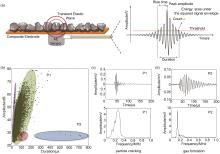
Fig. 3
Sensing principle of acoustic emission and typical waveform signals: (a) Acoustic emission technology sensing device and the obtained acoustic signal[22, 24]; (b)—(d) Typical waveforms and power spectra of acoustic signals[22][These waveform signals can represent particle cracking (b) and gas formation (c) during cycling]"

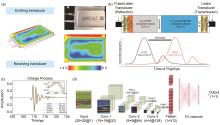
Fig. 4
Ultrasonic detection technology is employed to explore the state of batteries: (a) The distribution of the electrolyte and the gas production of the battery were imaged by the different transmittance of ultrasonic signal in the battery[19]; (b) The time of flight and the amplitude of acoustic signals are used as the indicators of the state of batteries[30]; (c) The evolution of acoustic wave signals during charge[31]; (d) Schematic illustration of the feedforward neural network[31]"

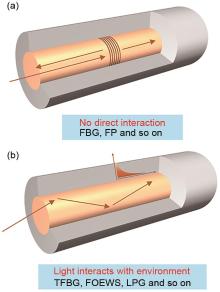
Fig. 5
Optical sensing methods: (a) There is no direct interaction between light and the environment (such as fiber Bragg grating, Fabry-Perot sensor and so on); (b) Light interacts directly with the environment (such as titled fiber Bragg grating, fiber-optics evanescent wave sensor, long period fiber grating and so on)"

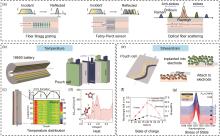
Fig. 6
Optical sensing methods: there is no direct interaction between light and the environment: (a) Schematic of three commonly used optical fiber, including fiber Bragg grating (left) and Fabry-Perot sensor (middle) based on the principle of reflection and scattering fiber based on scattering (right); (b) Place an optical fiber sensor inside a 18650 battery or pouch cell to monitor the internal temperature of the battery[21, 32]; (c) Temperature distribution map of a 18650 battery during cycling[33]; (d) Heat variation during battery formation process related to electrochemical reactions[21]; (e) Implanting a optical fiber sensor into or placing it on the surface of the electrode to monitor the evolution of stress during cycling; Stress evolution of graphite anode[35] (f) and InLi anode[38] (g) during cycling"

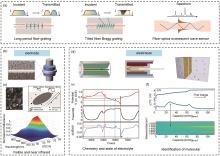
Fig. 7
Optical sensing methods: light interacts directly with the environment: (a) Schematic of three commonly used optical fiber, including long period fiber grating (left), titled fiber Bragg grating (middle) and fiber-optics evanescent wave sensor (right); (b) Place an optical fiber sensor on the surface of graphite anode in Swagelok cell to monitor its spectroscopy[41]; (c) Reflectance spectroscopy measurements of graphite anode[41]; (d) Placing a fiber optic sensor inside the battery and in contact with the electrolyte to monitor the working state of the electrolyte[44, 46, 47]; (e) Stable and reproducible correlation between the voltage and the optical power level of the implanted fiber sensor during cycling[46]; (f) Temperature and infrared absorption spectrum of electrolyte during the charging process of a 18650 battery[44]"

| 1 | TIAN Y S, ZENG G B, RUTT A, et al. Promises and challenges of next-generation "beyond Li-ion" batteries for electric vehicles and grid decarbonization[J]. Chemical Reviews, 2021, 121(3): 1623-1669. |
| 2 | HUANG Y M, LI J. Key challenges for grid-scale lithium-ion battery energy storage[J]. Advanced Energy Materials, 2022, 12(48): 2202197. |
| 3 | XIANG J W, WEI Y, ZHONG Y, et al. Building practical high-voltage cathode materials for lithium-ion batteries[J]. Advanced Materials, 2022, 34(52): 2200912. |
| 4 | KIM N, KIM Y, SUNG J, et al. Issues impeding the commercialization of laboratory innovations for energy-dense Si-containing lithium-ion batteries[J]. Nature Energy, 2023, 8(9): 921-933. |
| 5 | XIANG J W, YANG L Y, YUAN L X, et al. Alkali-metal anodes: From lab to market[J]. Joule, 2019, 3(10): 2334-2363. |
| 6 | DUAN J, TANG X, DAI H F, et al. Building safe lithium-ion batteries for electric vehicles: A review[J]. Electrochemical Energy Reviews, 2020, 3(1): 1-42. |
| 7 | DOMINKO R, FICHTNER M, OTUSZEWSKI T, et al. Battery 2030+[EB/OL]. [2023-01-05]. https://battery2030.eu/research/roadmap/ |
| 8 | 辛耀达, 李娜, 杨乐, 等. 锂离子电池植入传感技术[J]. 储能科学与技术, 2022, 11(6): 1834-1846. |
| XIN Y D, LI N, YANG L, et al. Integrated sensing technology for lithium ion battery[J]. Energy Storage Science and Technology, 2022, 11(6): 1834-1846. | |
| 9 | 郝奕帆, 祝夏雨, 王静, 等. 电池无损检测监测方法分析[J]. 储能科学与技术, 2023, 12(5): 1713-1737. |
| HAO Y F, ZHU X Y, WANG J, et al. Analysis of battery nondestructive testing and monitoring methods[J]. Energy Storage Science and Technology, 2023, 12(5): 1713-1737. | |
| 10 | ZHANG Y, LI Y P, GUO Z Z, et al. Health monitoring by optical fiber sensing technology for rechargeable batteries[J]. eScience, 2023: 100174. |
| 11 | HUANG J Q, BOLES S T, TARASCON J M. Sensing as the key to battery lifetime and sustainability[J]. Nature Sustainability, 2022, 5(3): 194-204. |
| 12 | BRIGHT C T, GLADSTONE J H, PREECE W H, et al. Remarks on "On reversible lead batteries and their use for electric lighting"[J]. Journal of the Society of Telegraph-Engineers and Electricians, 1887, 16(66): 184-218. |
| 13 | NAGAI Y, TOMOKUNI Y, MATSUI T. Optical-type hydrometer for lead-acid batteries and its applications[C]//INTELEC'87-The Ninth International Telecommunications Energy Conference. June 14-17, 1987, Stockholm, Sweden. IEEE, 2009: 640-647. |
| 14 | LANPHIER R C. The ampere-hour meter for electric vehicles[C]//SAE Technical Paper Series. 400 Commonwealth Drive, Warrendale, PA, United States: SAE International, 1911, 6: 371-393. |
| 15 | KEDDAM M, STOYNOV Z, TAKENOUTI H. Impedance measurement on Pb/H2SO4 batteries[J]. Journal of Applied Electrochemistry, 1977, 7(6): 539-544. |
| 16 | MAS J A. Battery charging system and transducer therefor[J]. United States Patent Office,1969. |
| 17 | CAO-PAZ A M, RODRÍGUEZ-PARDO L, FARIÑA J, et al. Resolution in QCM sensors for the viscosity and density of liquids: Application to lead acid batteries[J]. Sensors, 2012, 12(8): 10604-10620. |
| 18 | DAY R P, XIA J, PETIBON R, et al. Differential thermal analysis of Li-ion cells as an effective probe of liquid electrolyte evolution during aging[J]. Journal of the Electrochemical Society, 2015, 162(14): A2577-A2581. |
| 19 | DENG Z, HUANG Z Y, SHEN Y, et al. Ultrasonic scanning to observe wetting and "unwetting" in Li-ion pouch cells[J]. Joule, 2020, 4(9): 2017-2029. |
| 20 | WORRELL C A, REDFERN B A W. Acoustic emission studies of the breakdown of beta-alumina under conditions of sodium ion transport[J]. Journal of Materials Science, 1978, 13(7): 1515-1520. |
| 21 | HUANG J Q, ALBERO BLANQUER L, BONEFACINO J, et al. Operando decoding of chemical and thermal events in commercial Na(Li)-ion cells via optical sensors[J]. Nature Energy, 2020, 5(9): 674-683. |
| 22 | MAJASAN J O, ROBINSON J B, OWEN R E, et al. Recent advances in acoustic diagnostics for electrochemical power systems[J]. Journal of Physics: Energy, 2021, 3(3): 032011. |
| 23 | OHZUKU T, MATOBA N, SAWAI K. Direct evidence on anomalous expansion of graphite-negative electrodes on first charge by dilatometry[J]. Journal of Power Sources, 2001, 97/98: 73-77. |
| 24 | RHODES K, DUDNEY N, LARA-CURZIO E, et al. Understanding the degradation of silicon electrodes for lithium-ion batteries using acoustic emission[J]. Journal of the Electrochemical Society, 2010, 157(12): A1354. |
| 25 | CHOE C Y, JUNG W S, BYEON J W. Damage evaluation in lithium cobalt oxide/carbon electrodes of secondary battery by acoustic emission monitoring[J]. Materials Transactions, 2015, 56(2): 269-273. |
| 26 | 邓哲, 黄震宇, 刘磊, 等. 超声技术在锂离子电池表征中的应用[J]. 储能科学与技术, 2019, 8(6): 1033-1039. |
| DENG Z, HUANG Z Y, LIU L, et al. Applications of ultrasound technique in characterization of lithium-ion batteries[J]. Energy Storage Science and Technology, 2019, 8(6): 1033-1039. | |
| 27 | WU J Y, RAO Z X, LIU X T, et al. Lithium-metal batteries: Polycationic polymer layer for air-stable and dendrite-free Li metal anodes in carbonate electrolytes [J]. Advanced Materials, 2021, 33(12): e2007428. |
| 28 | 谢宏, 黄锴, 杜进桥, 等. 锂离子电池电解液痕量水污染的超声表象[J]. 储能科学与技术, 2022, 11(12): 4030-4037. |
| XIE H, HUANG K, DU J Q, et al. Studies on ultrasonic appearance of trace water contamination in lithium-ion battery electrolyte[J]. Energy Storage Science and Technology, 2022, 11(12): 4030-4037. | |
| 29 | HUO H Y, HUANG K, LUO W, et al. Evaluating interfacial stability in solid-state pouch cells via ultrasonic imaging[J]. ACS Energy Letters, 2022, 7(2): 650-658. |
| 30 | HSIEH A G, BHADRA S, HERTZBERG B J, et al. Electrochemical-acoustic time of flight: in operando correlation of physical dynamics with battery charge and health[J]. Energy & Environmental Science, 2015, 8(5): 1569-1577. |
| 31 | HUANG Z Y, ZHOU Y, DENG Z, et al. Precise state-of-charge mapping via deep learning on ultrasonic transmission signals for lithium-ion batteries[J]. ACS Applied Materials & Interfaces, 2023, 15(6): 8217-8223. |
| 32 | YU Y F, VERGORI E, MADDAR F, et al. Real-time monitoring of internal structural deformation and thermal events in lithium-ion cell via embedded distributed optical fibre[J]. Journal of Power Sources, 2022, 521: 230957. |
| 33 | HUANG J Q, BLANQUER L A, GERVILLIÉ C, et al. Distributed fiber optic sensing to assess In-live temperature imaging inside batteries: Rayleigh and FBGs[J]. Journal of the Electrochemical Society, 2021, 168(6): 060520. |
| 34 | MEI W X, LIU Z, WANG C D, et al. Operando monitoring of thermal runaway in commercial lithium-ion cells via advanced lab-on-fiber technologies[J]. Nature Communications, 2023, 14: 5251. |
| 35 | BAE C J, MANANDHAR A, KIESEL P, et al. Monitoring the strain evolution of lithium-ion battery electrodes using an optical fiber Bragg grating sensor[J]. Energy Technology, 2016, 4(7): 851-855. |
| 36 | GANGULI A, SAHA B, RAGHAVAN A, et al. Embedded fiber-optic sensing for accurate internal monitoring of cell state in advanced battery management systems part 2: Internal cell signals and utility for state estimation[J]. Journal of Power Sources, 2017, 341: 474-482. |
| 37 | MIAO Z Y, LI Y P, XIAO X P, et al. Direct optical fiber monitor on stress evolution of the sulfur-based cathodes for lithium-sulfur batteries[J]. Energy & Environmental Science, 2022, 15(5): 2029-2038. |
| 38 | ALBERO BLANQUER L, MARCHINI F, SEITZ J R, et al. Optical sensors for operando stress monitoring in lithium-based batteries containing solid-state or liquid electrolytes[J]. Nature Communications, 2022, 13: 1153. |
| 39 | LI Y P, ZHANG Y, LI Z, et al. Operando decoding of surface strain in anode-free lithium metal batteries via optical fiber sensor[J]. Advanced Science, 2022, 9(26): e2203247. |
| 40 | XI J W, LI J Z, SUN H, et al. In-situ monitoring of internal temperature and strain of solid-state battery based on optical fiber sensors[J]. Sensors and Actuators A: Physical, 2022, 347: 113888. |
| 41 | GHANNOUM A, NORRIS R C, IYER K, et al. Optical characterization of commercial lithiated graphite battery electrodes and in situ fiber optic evanescent wave spectroscopy[J]. ACS Applied Materials & Interfaces, 2016, 8(29): 18763-18769. |
| 42 | GHANNOUM A, NIEVA P, YU A P, et al. Development of embedded fiber-optic evanescent wave sensors for optical characterization of graphite anodes in lithium-ion batteries[J]. ACS Applied Materials & Interfaces, 2017, 9(47): 41284-41290. |
| 43 | HEDMAN J, NILEBO D, LARSSON LANGHAMMER E, et al. Fibre optic sensor for characterisation of lithium-ion batteries[J]. ChemSusChem, 2020, 13(21): 5731-5739. |
| 44 | GERVILLIÉ-MOURAVIEFF C, BOUSSARD-PLÉDEL C, HUANG J Q, et al. Unlocking cell chemistry evolution with operando fibre optic infrared spectroscopy in commercial Na(Li)-ion batteries[J]. Nature Energy, 2022, 7:1157-1169. |
| 45 | HUANG J Q, HAN X L, LIU F, et al. Monitoring battery electrolyte chemistry via in-operando tilted fiber Bragg grating sensors[J]. Energy & Environmental Science, 2021, 14(12): 6464-6475. |
| 46 | WANG R L, ZHANG H Z, LIU Q Y, et al. Operando monitoring of ion activities in aqueous batteries with plasmonic fiber-optic sensors[J]. Nature Communications, 2022, 13: 547. |
| 47 | MIELE E, DOSE W M, MANYAKIN I, et al. Hollow-core optical fibre sensors for operando Raman spectroscopy investigation of Li-ion battery liquid electrolytes[J]. Nature Communications, 2022, 13: 1651. |
| [1] | Chen LI, Huilin ZHANG, Jianping ZHANG. Estimated state of health for retired lithium batteries using kernel function and hyperparameter optimization [J]. Energy Storage Science and Technology, 2024, 13(6): 2010-2021. |
| [2] | Chenwei LI, Shiguo XU, Haifeng YU, Songmin YU, Hao JIANG. Synthesis of Mg-doped LiFe0.5Mn0.5PO4/C cathode materials for Li-ion batteries [J]. Energy Storage Science and Technology, 2024, 13(6): 1767-1774. |
| [3] | Qi SUN, Hao PENG, Qingguo MENG, Dekai KONG, Rui FENG. Thermal adaptability of energy storage battery pack in extreme conditions [J]. Energy Storage Science and Technology, 2024, 13(6): 2039-2043. |
| [4] | Yuchao ZHANG, Fengjiao ZHANG, Wei LOU, Feixiang ZAN, Linling WANG, Anxu SHENG, Xiaohui WU, Jing CHEN. Transformation process of valuable metals in the recycling of spent lithium-ion batteries and the potential environmental impact [J]. Energy Storage Science and Technology, 2024, 13(6): 1861-1870. |
| [5] | Runyuan LI, Fu'ao GUO, Gangchao ZHAO. Early warning method for fire safety of containerized lithium-ion battery energy storage systems [J]. Energy Storage Science and Technology, 2024, 13(5): 1595-1602. |
| [6] | Yuanhui TANG, Boxing YUAN, Jie LI, Yunlong ZHANG. Study on the safety of cylindrical lithium-ion batteries under nail penetration conditions [J]. Energy Storage Science and Technology, 2024, 13(4): 1326-1334. |
| [7] | Bingjin LI, Xiaoxia HAN, Wenjie ZHANG, Weiguo ZENG, Jinde WU. Review of the remaining useful life prediction methods for lithium-ion batteries [J]. Energy Storage Science and Technology, 2024, 13(4): 1266-1276. |
| [8] | Jiamu YANG, Yuxin CHEN, Cheng LIAN, Zhi XU, Honglai LIU. Flow field analysis and structural optimization of coating die with electrode slurry [J]. Energy Storage Science and Technology, 2024, 13(4): 1109-1117. |
| [9] | Mingming SUN. Patent analysis of organic-inorganic composite solid-state electrolytes for lithium-ion batteries [J]. Energy Storage Science and Technology, 2024, 13(3): 1096-1105. |
| [10] | Chengjie XU, Yulin HUANG, Zhongfeiyu LIN, Zhiming LIN, Chenxi FANG, Weijun ZHANG, Zhigao HUANG, Jiaxin LI. Macroscopic fabrication of nano-silicon via sand-milling and investigation of lithium storage performance in carbon fiber composite anodes [J]. Energy Storage Science and Technology, 2024, 13(1): 1-11. |
| [11] | Xiaowei HUANG, Shaopeng LI, Xiaogang ZHANG. Research on the impact and mechanism of the lithium replenishment degree of anode prelithiation on the performance of lithium-ion batteries [J]. Energy Storage Science and Technology, 2023, 12(9): 2727-2734. |
| [12] | Xin GAO, Ruogu WANG, Wenjing GAO, Zejun DENG, Ruiqi LIANG, Kun YANG. Consistency evaluation method of battery pack in energy storage power station based on running data [J]. Energy Storage Science and Technology, 2023, 12(9): 2937-2945. |
| [13] | Yonghao HUANG, Guojing ZANG, Weiya ZHU, Youhao LIAO, Weishan LI. Enhancing interfacial stability between lithium-containing ceramic separator and 4.35 V LiNi0.8Co0.1Mn0.1O2 cathode through LiF additives [J]. Energy Storage Science and Technology, 2023, 12(8): 2361-2369. |
| [14] | Zhiwei CHEN, Weige ZHANG, Junwei ZHANG, Yanru ZHANG. Comprehensive health assessment and screening method of power battery pack based on visual characteristics of charge curves [J]. Energy Storage Science and Technology, 2023, 12(7): 2211-2219. |
| [15] | Chong XU, Ning XU, Zhimin JIANG, Zhongkai LI, Yang HU, Hong YAN, Guoqiang MA. Mechanisms of gas evolution and suppressing strategies based on the electrolyte in lithium-ion batteries [J]. Energy Storage Science and Technology, 2023, 12(7): 2119-2133. |
| Viewed | ||||||
|
Full text |
|
|||||
|
Abstract |
|
|||||
